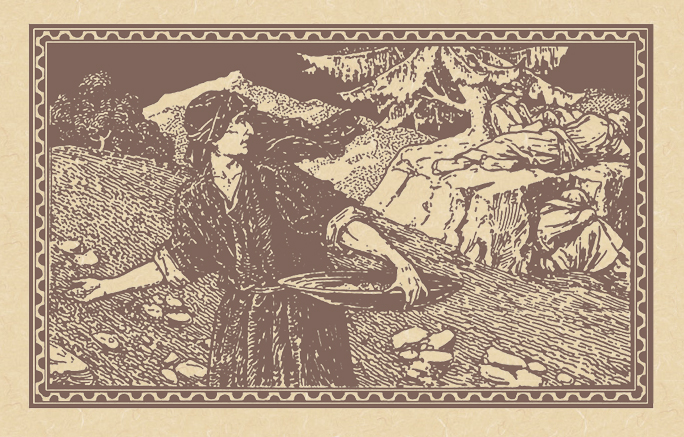Why Is God Letting This Happen to Me?
The Sixteenth Saturday of Ordinary Time; or, the Saturday Memorial of the Blessed Virgin Mary.
Lessons from the secondary feria, according to the ordinary form of the Roman Rite:
• Jeremiah 7: 1-11.
• Psalm 84: 3-6, 8, 11.
• Matthew 13: 24-30.
|
When a Mass for the memorial is taken, lessons from the feria as above, or any lessons from the common of the Blessed Virgin Mary.
|
The Third Class Feast of Saints Nazarius & Celsus, Martyrs; Saint Victor I, Pope & Martyr; and Saint Innocent I, Pope & Confessor.
First Lesson from the proper, the rest from the common "Intret…" of Many Martyrs, according to the extraordinary form of the Roman Rite:
• Wisdom 10: 17-20.
• [Gradual] Exodus 15: 11, 6.
• Luke 21: 9-19.
FatherVenditti.com
|
 7:07 AM 7/28/2018 — In the case of the Parable of the Wheat and the Weeds—or, as the more traditional translations put it, the Wheat and the Tares—knowing the meaning of the parable is only the beginning of the problem for us, because it's message is not one we are likely to accept without struggle. The good and the bad live on this earth side by side; they aren't sorted out until the final judgment. And as for rewarding good deeds and punishing evil, that, too, is left for the end of all things; it doesn't happen now. And you can see how difficult a concept this is for us, raised as we are with such a strict sense of justice and reciprocity. When someone famous is accused of a crime, and the trial is aired on television, and the person is acquitted even though we were all convinced of his guilt, we become angry. Why are we angry? Because we feel that justice has not been done. Whenever a part of our country is hit by some disaster—whether it’s a terrorist attack or some sort of natural disaster or any kind of catastrophic event that causes lose of life—what's the first thing everyone wants to know? “Who can we blame? Who should have known? Who can we make accountable?” And we feel that way because evil must be punished. We can't stand the idea of someone not getting their comeuppance. 7:07 AM 7/28/2018 — In the case of the Parable of the Wheat and the Weeds—or, as the more traditional translations put it, the Wheat and the Tares—knowing the meaning of the parable is only the beginning of the problem for us, because it's message is not one we are likely to accept without struggle. The good and the bad live on this earth side by side; they aren't sorted out until the final judgment. And as for rewarding good deeds and punishing evil, that, too, is left for the end of all things; it doesn't happen now. And you can see how difficult a concept this is for us, raised as we are with such a strict sense of justice and reciprocity. When someone famous is accused of a crime, and the trial is aired on television, and the person is acquitted even though we were all convinced of his guilt, we become angry. Why are we angry? Because we feel that justice has not been done. Whenever a part of our country is hit by some disaster—whether it’s a terrorist attack or some sort of natural disaster or any kind of catastrophic event that causes lose of life—what's the first thing everyone wants to know? “Who can we blame? Who should have known? Who can we make accountable?” And we feel that way because evil must be punished. We can't stand the idea of someone not getting their comeuppance.
But what's most disturbing about this attitude that all justice and all recompense must be in the here and now is that it is rooted, I believe, in a lack of faith. We try to go through the motions of believing our Lord: we confess our sins, we grieve for the wrong we've done to others, we offer prayers and sacrifices for the outrages committed against our Lord, our Blessed Mother, our Church; but, when push comes to shove, and some tragedy comes our way, we just can't help ourselves, and find ourselves asking that perennial question of doubt: “I've lived a good life; why is God letting this happen to me?” The answer, of course, is in the parable; but, we don't want to hear it, and so we block it out of our minds as if our Lord doesn't really mean what he says. On Sundays and solemnities, when we recite the Creed, we'll all say together, “…I look forward to the resurrection of the dead and the life of the world to come,” and we say it with all sincerity; but, saying it and believing it are two different things, and living it is something different altogether.
To live in the midst of this world without being a part of it; to pace out the course of our lives as pilgrims whose journey does not end except in heaven: that is the faith that Jesus challenges us to embrace. There isn't one of us here who hasn't failed to embrace that faith at some point in his or her life. But, thanks be to God, we have a Savior who understand our human condition because he became one. He took our sins upon Himself, and offered Himself as a sacrifice on the altar of the Cross, a sacrifice which we will have reproduced for us upon this altar, and the broken Body of our God will again be offered to us to adore and receive in Holy Communion. That is a great grace, and one that can overcome all our lack of faith, if we will only dispose ourselves to allow it.

|

